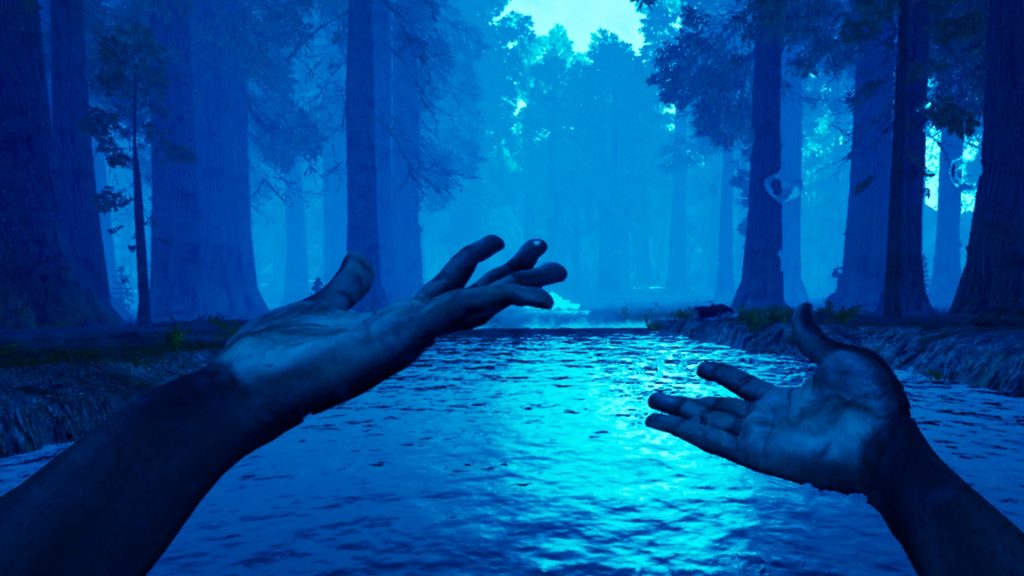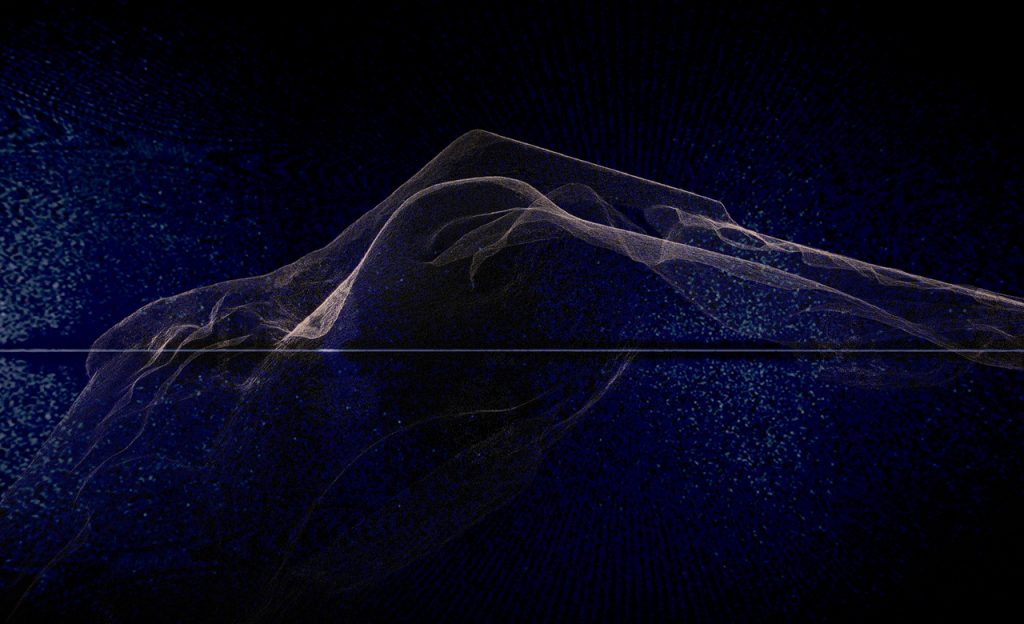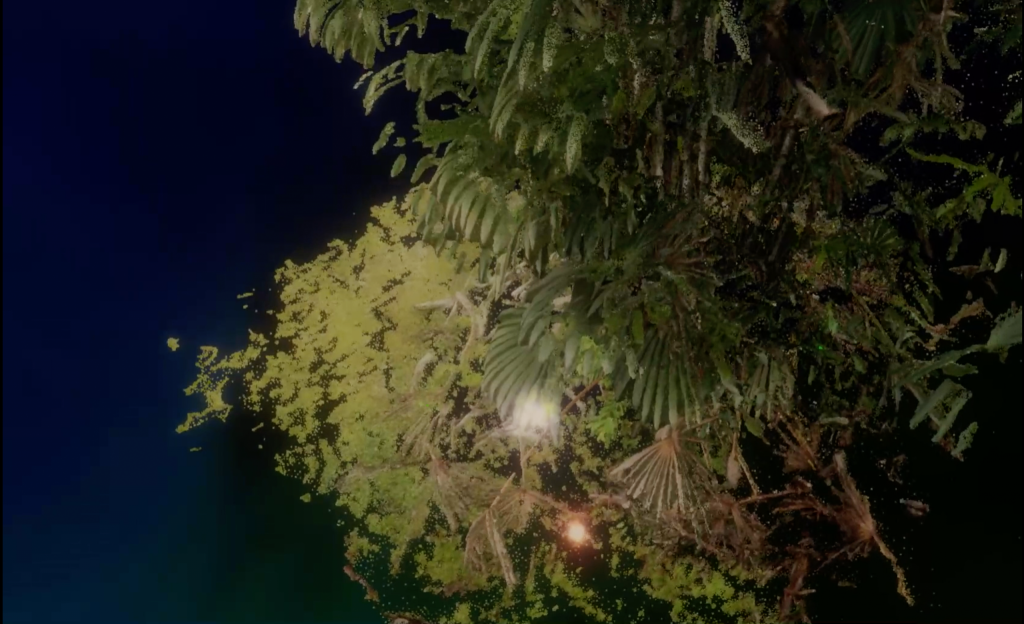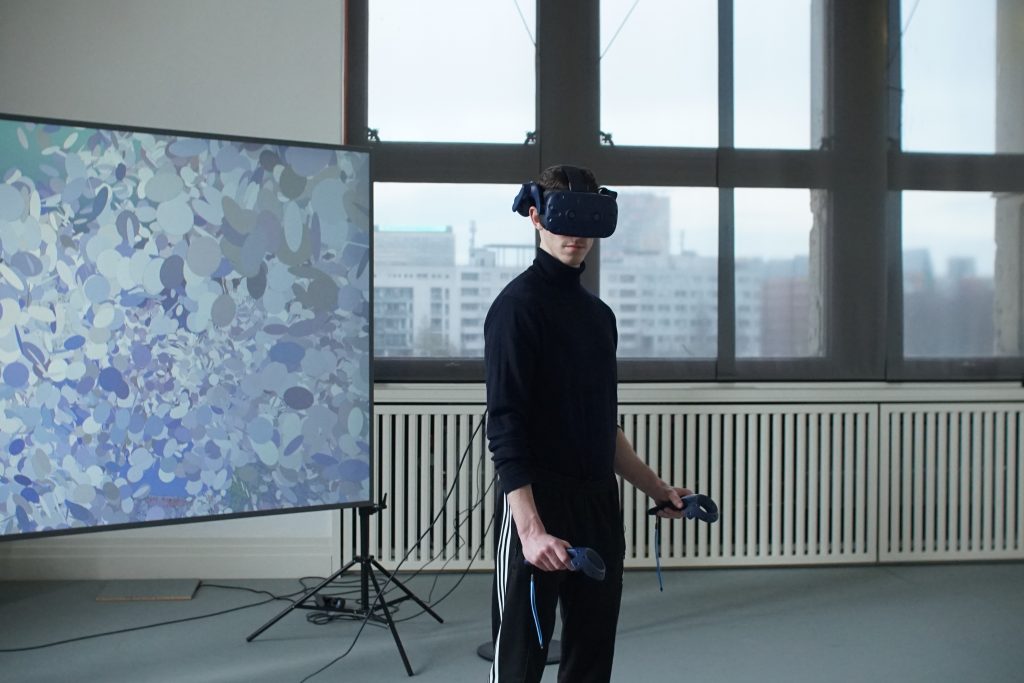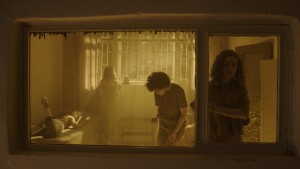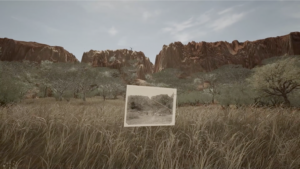Doireann O’Malley
Virtual Tendencies
Donnerstag, 28. Januar 2021 | 6 pm | Conversation and Q&A on Zoom and Facebook Live
Please scroll through the audio-visual gallery above or see the list below with works and conversations by Calum Bowden, Adam Fearon, Rindon Johnson, Doireann O’Malley, Omsk Social Club and Simon Speiser.
- Lucid Software: An Alternative Genealogy of Virtual Reality, 2021; a lecture performance by Omsk Social Club.
- Calum Bowden demonstrating his VR experience Mephisto and the Extremophile, 2020.
- Simon Speiser demonstrating his VR experience In a Young World of Resplendent Glitter, 2018.
- Doireann O’Malley demonstrating their VR experience New Maps of Hyperspace_Test_01, 2020.
- Paravents, 2021; a video lecture by Adam Fearon.
- A demonstration of Kristopher Rindon Johnson‘s „Diana Said: […]”, 2019.
- A conversation with Calum Bowden, Rindon Johnson, and Doireann O’Malley.
- A conversation with Thomas Butler, Doireann O’Malley, Simon Speiser.
During the online event we will further explore questions related to the research and works and invite you to join the conversation and pose your own questions. With Calum Bowden, Adam Fearon, Omsk Social Club and Simon Speiser as well as Thomas, Butler, Rike Frank and Doireann O’Malley.
To join via Facebook Live please click here.
www.facebook.com/kuenstlerischeforschung.berlin/live/
To join via Zoom please click here.
Meeting ID: 967 7281 2440
Passcode: 136582
“Virtual Tendencies” is a series of talks, screenings, lecture performances, LARPs and VR experiences organised as part of ongoing research by artist Doireann O’Malley with the assistance of Thomas Butler.
A tendency can be described as an inclination towards a particular type of behaviour. In the context of the virtual, our tendency to find ourselves immersed in online and, increasingly, VR environments is described by curator and writer Legacy Russel as a near uninterrupted AFK (away from the keyboard) virtual experience, so that the separation between the ‘real world’ and the ‘virtual’ has become more difficult to discern. Writing on behavioural and bodily modification has given rise to some of the most interesting debates around the influence of our virtual interactions on what have become compulsively absorbing online platforms. This was echoed as far back as 1998 when artist Shu Lea Cheang talked of the emergence of a ‘Social Digi Body’ and the production of identities and bodies through social interaction in the digital sphere.1 Human behaviour, psychology and subjectivity have markedly shifted over the past 20 years and the ‘Social Digi Body’ has continued relevance as a term applied to bodies and subjectivities produced in the contemporary moment. Increasingly, the levels of engagement with the virtual are often determined by the technological prostheses to which bodies have now more or less merged. By expanding on the concept of the virtual as a representational system created and powered by a vast global infrastructure that mediates our daily lives, and as a technological metaphor for consciousness, Virtual Tendencies will touch on myriad themes, from our accelerating cyber symbiosis; virtual embodiment and gender; ecology and resource extraction; affective computing and the online casino environment; to trauma and mental health. Invited participants will thus explore some aspect of the virtual and its intersection with their practices. This is at a moment when we are faced with multiple crises, from a pandemic that has ushered in an unprecedented social experiment with a significant shift to working, consuming and socializing online, to unsustainable resource extraction and ecological collapse.
1 See Jeppe Ugelvig’s writing on Shu Lea Cheang’s web-art work Brandon, 1998 in ‘The Digiarchitextual Body —: Brandon’s Corporal Virtualities.’ Parallax, 2019
Biographies
Calum Bowden lives and works in Berlin. He creates stories, worlds, and platforms that reimagine relations between organisms and algorithms, humans and nonhumans, the Earth and the cosmos. He co-founded Trust and Black Swan. Calum took part in the post-graduate program at the Strelka Institute, Moscow. He has an MA in Design Interactions from the Royal College of Art and a BSc in Anthropology from University College London.
Adam Fearon (b. 1984, Ireland) lives and works in Berlin, Germany. He received his BFA from the National College of Art & Design (2003-07), and has studied at Athens School of Fine Art, Athens, Greece (Erasmas Program 2006), Haute Ecole d’Art et de Design, Geneva, Switzerland (PostGrad ALpes 2010-11) and Städelschule, Frankfurt am Main, Germany (Meisterschule 2011-2014). In 2019 he was a recipient of the Arts Council of Ireland’s Next Generation award. He has participated in several national and international artist residencies. Solo projects include: Relief, Butler Gallery, Killkenny, (2019) Lignin, Harbinger, Reyjavik (2018), Things I Think I Want Frankfurter Kunstverein, Germany (2017), p13n (solo), Room E10-27, Paris. Group shows include: Pashmina, Museum für Moderne Kunst, Frankfurt (2014), Berlin Art Prize*, District, Berlin (2015), Soft Costs, Wiesen Kunstverein (2016), Augury, BQ, Berlin (2016), TWILL, Kunsthal ved am seden af, Svendborg, Denmark (2017).
Rindon Johnson (b. 1990, San Francisco, United States) lives and works in New York and Berlin. His most recent virtual reality film, Meat Growers: A Love Story, was commissioned by Rhizome and Tentacular. Johnson has read, exhibited and lectured internationally. He is the author of Nobody Sleeps Better Than White People (Inpatient, 2016), the VR book, Meet in the Corner (Publishing-House.Me, 2017) and Shade the King (Capricious, 2017). He lives in Berlin where he is an Associate Fellow at the Universität der Künste Berlin; he studies VR. In winter 2021, Johnson will open a pendant exhibition first at SculptureCenter, New York and later at Chisenhale, London.
Doireann O’Malley (b. 1981, Ireland) holds an MFA from University of Ulster in Belfast, UK. Their multidisciplinary, research-led practice encompasses video, VR and performance that stage an immersive, world-building that captures new modes of subjectivity beyond the narrow gender binaries and rigid role models inherited from a western-centric scientific and philosophical legacy. They are currently a participant of the Berlin Program for Artists (BPA), and a research fellow at the Berliner Förderprogramm Künstlerische Forschung 2020-2021. They are also a guest professor on the MFA programme at Zurich’s University of the Arts for the winter and spring semesters. Recent exhibitions, talks and screenings include, Art Taaalksss, Art Institute, Basel, CH; Zielona Góra Biennale, PL; Urban Video Project, Light Work at The Everson Museum Syracuse, NY, USA; and Neuer Berliner Kunstverein (n.b.k.), Berlin, DE.
Omsk Social Club forks traditional methods of Live Action Role Play (Larp) and Real Game Play (RGP) to induce states that could potentially be a fiction or a yet, unlived reality. Omsk works closely with networks of players, everything is unique and unrehearsed. The game designs and installations they create examine virtual egos, popular experiences and political phenomena. They have exhibited across Europe in various institutions, galleries and off sites such as Martin Gropius Bau, House of Electronic Kunst Basel, Migros Museum für Gegenwartskunst, Zürich, HKW, Berlin, CCCB, Barcelona and Onasis Foundation, Athens.
Simon Speiser (b. 1988, Germany) studied Fine Arts in ABK Stuttgart and Städelschule Frankfurt, with Christian Jankowski, Alexander Roob, Willem de Rooij, Michael Krebber and Mark von Schlegell. In his practice he develops fictional concepts and ideas that merge nature and technology. This often brings various disciplines into dialogue, ranging from writing, sculpture and installation to printing, video and VR. He took part in several group and solo shows in institutions, galleries and project spaces including the Frankfurter Kunstverein, MMK Frankfurt, CAC Quito, Oracle Berlin, Croy Nielsen, MMCA Seoul and Robert Grunenberg.
